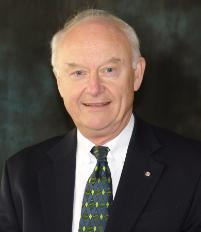Non-aligned unis call for holistic policy debate
Published on 25 November, 2008
Statement by 14 Vice-Chancellors of Australia's non-aligned Universities* before the Bradley Report.
As the Vice-Chancellors of 14 non-aligned Australian universities, we keenly anticipate both the upcoming report of the Bradley Review of Higher Education and the Government's response.

CQUniversity Vice-Chancellor John Rickard
The Bradley report and its recommendations will require testing through analysis, elucidation and critique. We look forward to a future Government plan for the tertiary education sector that is equitable, visionary and sustainable.
As the leaders of universities comprising a critical mass of Australia's higher education sector, we stress that it will be imperative in the post-Bradley period that the policy debate about universities be set in the interests of the sector as a whole, not any of its particular components.
A future higher education policy that does not deal adequately with all universities will be one that disadvantages a significant number of students, Australian and international, future teachers and health professionals, Australia's underprivileged, rural and metropolitan regions and Indigenous people.
The Tests for the Bradley Review report and the Government's response:
Our universities are crucial to Australia's higher education system and to the workability and equity of any future policy prescription applied to that system. We will assess the Bradley report and the Government's response against the 3 fundamental imperatives of:
- § social inclusion;
- § education and training for a skilled and professional workforce; and
- § support for research with impact.
Social Inclusion:
Australia's non-aligned universities have long been institutionally committed to providing more opportunities to those who are doing least well, whether these are students facing social or economical disadvantage, regional and rural students, Indigenous students, older Australians seeking essential skills and learning, or students with a disability.
The same principle underlies the Commonwealth Government's most basic educational policies.
Our universities will look to the Bradley report and the Government's response for:
•a. major improvement in the support of students, such as extensions of living and accommodation scholarships and greater student income support;
•b. systemic change ensuring that funding for teaching and learning takes account of the likely learning support needs of the group of students educated by each university to support equitable outcomes for students from different backgrounds; and
•c. avoidance of proposals that have the practical effect of reducing access to or funding of higher education for the disadvantaged and marginalized.
Education and training for a skilled and professional workforce:
Universities are Australia's major sources of skilled, flexible, creative labour. Our universities are the Universities of Work: they have a particular capacity to produce an immense variety of work-ready, internationally recognised graduates. Our graduates are trained to meet both their own expectations of employment and their employer's expectations of quality across all regions of Australia.
Our Universities will look to the Bradley report and Government response for concrete means to:
•d. strengthen the contribution of industry and employers to universities; and
- e. support those universities with an institutional emphasis upon ensuring the fitness of graduates for employment and life-long adaptability as working professionals.
Research with impact:
Research is fundamental to all universities, but types of research do and should vary, from the pure or abstract to the applied and engaged. Our universities' research is heavily weighted to research for deployment in partnership with industry, Government and communities. It works towards social, technological, health and other practical outcomes, with significant regional, national and international impact, in fields such as health and well-being, technology, education and social inquiry.
Hence, we believe research should be funded on the basis of its quality, with strong support should be available for research with demonstrated meaningful application.
•f. Our universities will look to the Bradley report and Government response for concrete means to support strong research funding for research that engages with current industry and community need.
Why non-aligned Universities matter:
The non-aligned Universities comprise a real and varied collectivity of students, staff and associated communities. These Universities in 2007:
- § Enrolled 376,017 students, representing 38% of the national total, more students than any of the formal interest groups;
- § Enrolled 38%of all international students;
- § Earned $4.8 billion, being 28% of Australian University revenue;
- § Taught 51% of teacher education students and 53% of nursing students;
- § Taught 46% of lower SES students;
- § Taught 57% of regional students and 45% of remote students;
- § Taught 43% of indigenous students; and
- § Taught 39% of students with a disability.
Conclusion:
The Bradley Review of Higher Education is vital to Australia's future. As 14 Vice-Chancellors from the non-aligned universities which make up a significant part of Australian higher education, we look forward to its constructive recommendations to ensure our institutions can continue to meet the needs of all Australians and our international students.
- The non-aligned universities are: CQUniversity, University of Ballarat, Australian Catholic University, Deakin University, University of Canberra, Edith Cowan University, The University of New England, Charles Darwin University, University of Western Sydney, Victoria University, University of Southern Queensland, University of the Sunshine Coast, Southern Cross University, Swinburne University of Technology.
Note on Data:
The data cited refer to all universities which are not members of the Australian Technology Network, the Group of Eight, or the Innovative Research Universities Australia.
The data are drawn from:
Finance 2007: Selected Higher Education Statistics, DEEWR 2008, http://www.dest.gov.au/sectors/higher_education/publications_resources/profiles/Finance_2007_stats.htm
Students 2007 [full year]: selected higher education statistics, DEEWR 2008 http://www.dest.gov.au/sectors/higher_education/publications_resources/profiles/Students_2007_full_year_.htm

